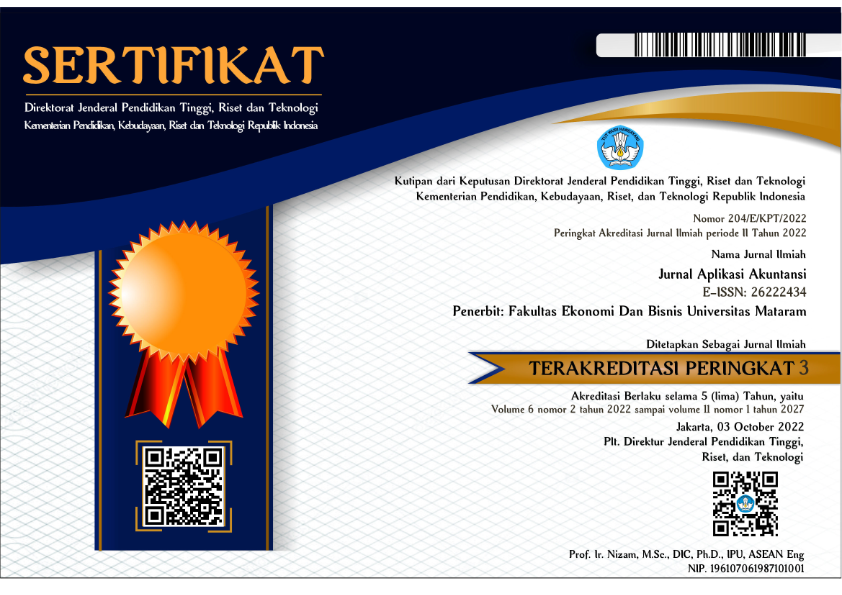INDONESIAN BOND YIELDS: INFLATION, FED RATES, AND EXCHANGE RATE EFFECTS
DOI:
https://doi.org/10.29303/jaa.v10i1.695Keywords:
Government Bond Yield, Inflation, US Fed Rate, Exchange Rate, Indonesia USAbstract
This research aims to analyze the effects of Indonesian inflation, the rise of the US Fed rate, and the exchange rate on the yield of Indonesian government bonds. This study employs a quantitative approach using secondary data obtained from reliable sources, such as the Bloomberg database, the official website of Bank Indonesia, and the official website of the Federal Reserve. The sample comprises 132 months of macroeconomic rates and prices, covering 10 years from 2012 to 2022. Data analysis included descriptive statistics, classical assumption tests, and stationarity testing. While previous studies have analysed the effects of these factors on government bond prices, this study investigates explicitly their impact on government bond yield in Indonesia. The results show that inflation and the exchange rate positively affect the Indonesian government bond yield. However, the rise in the US Federal Reserve rate does not significantly drive changes in the Indonesian government bond yield.
References
Adiwibowo, P., & Sihombing, P. (2019). Determinant of government bond yields. Dinasti International Journal of Digital Business Management, 1(1), 86–99. https://doi.org/10.31933/DIJDBM
Afonso, A., Alves, J., & Balhote, R. (2019). Interactions between monetary and fiscal policies. Journal of Applied Economics, 22(1), 132–151. https://doi.org/10.1080/15140326.2019.1583309
Bank Indonesia. (n.d.-a). About BI. Retrieved July 24, 2025, from https://www.bi.go.id/en/tentang-bi/default.aspx
Bank Indonesia. (n.d.-b). Inflation Data. Retrieved July 24, 2025, from https://www.bi.go.id/en/fungsiutama/moneter/inflasi/default.apx
Bank Indonesia. (n.d.-c). Low Core Inflation Maintained in July 2022. Retrieved July 24, 2025, from https://www.bi.go.id/en/publikasi/ruang-media/news-release/Pages/sp_2420222.aspx#:~:text=Core%20inflation%20was%20maintained%20low,(mtm)%20in%20June%202022
Chiesa, M., & Barua, S. (2019). The surge of impact borrowing: the magnitude and determinants of green bond supply and its heterogeneity across markets. Journal of Sustainable Finance and Investment, 9(2), 138–161. https://doi.org/10.1080/20430795.2018.1550993
Cushman, D. O., & De Vita, G. (2017). Exchange rate regimes and FDI in developing countries: A propensity score matching approach. Journal of International Money and Finance, 77, 143–163. https://doi.org/10.1016/j.jimonfin.2017.07.018
Ehling, P., Gallmeyer, M., Heyerdahl-Larsen, C., Illeditsch, P., We, ⇤, Bhamra, H., Bond, P., Carlson, M., Chernov, M., Cocco, J., Cuoco, D., Chun, A. L., David, A., Du↵ee, G., Feldhütter, P., Fisher, A., Garlappi, L., Giammarino, R., Gomes, F., … Yaron, A. (2016). Disagreement about Inflation and the Yield Curve ⇤. In Journal of Financial Economics (Vol. 127, Issue 3, pp. 459–484).
Erdal, B., & Pınar, A. (2019). Major Determinants of Economic Growth under Intermediate and Flexible Exchange Rate Regimes: Empirical Evidence from Turkey. Advances in Management & Applied Economics, 9(1), 1792–7552.
Fedorova, E., & Meshkova, E. (2021). Monetary policy and market interest rates: literature review using text analysis. International Journal of Development Issues, 20(3), 358–373. https://doi.org/10.1108/IJDI-02-2021-0049
Gonzalez, L. M., Llanto, C., & Manapat, C. (2022). The Relationship between Philippine Population, Remittances, Foreign Direct Investment, and Trade Openness on its Gross Domestic Product. Journal of Economics, Finance and Accounting Studies, 4(4), 168–201. https://doi.org/10.32996/jefas.2022.4.4.19
Hatane, S. E. (2012). GARCH-Type Models on the Volatility of Indonesian Cocoa’s Spot Price Returns. Jurnal Manajemen Dan Kewirausahaan, 13(2), 117–123. https://doi.org/10.9744/jmk.13.2.117-123
Ilmas, N., Amelia, M., & Risandi, R. (2022). Analysis of The Effect of Inflation And Exchange Rate on Exports in 5-Year Asean Countries (Years 2010–2020). Jurnal Ekonomi Trisakti, 2(1), 121–132. https://doi.org/10.25105/jet.v2i1.13561
Jamil, M. N., Rasheed, A., Maqbool, A., & Mukhtar, Z. (2023). Cross-cultural study the macro variables and its impact on exchange rate regimes. Future Business Journal, 9(1). https://doi.org/10.1186/s43093-023-00189-1
Koroleva, E., & Kopeykin, M. (2022). Understanding of Macro Factors That Affect Yield of Government Bonds. Risks, 10(8), 166. https://doi.org/10.3390/risks10080166
Mehar, M. A. (2023). Role of monetary policy in economic growth and development: from theory to empirical evidence. Asian Journal of Economics and Banking, 7(1), 99–120. https://doi.org/10.1108/AJEB-12-2021-0148
Meyer, D. F., & Hassan, A. S. (2020). Analysis of the impact of exchange rate volatility on the South African Government bond market. International Journal of Economics and Finance Studies, 12(2), 271–289. https://doi.org/10.34109/ijefs.202012202
Nababan, T. S. (2019). Development Analysis of Global Competitiveness Index of ASEAN-7 Countries and Its Relationship on Gross Domestic Product. Integrated Journal of Business and Economics, 3(1), 1–14. https://doi.org/10.33019/ijbe.v3i1.108
Nakamura, E., & Steinsson, J. (2018). Identification in macroeconomics. Journal of Economic Perspectives, 32(3), 59–86. https://doi.org/10.1257/jep.32.3.59
Nneka, U. J., Ngong, C. A., Ugoada, O. A., & Onwumere, J. U. J. (2022). Effect of bond market development on economic growth of selected developing countries. Journal of Economic and Administrative Sciences. https://doi.org/10.1108/jeas-01-2022-0015
Ongan, S., & Gocer, I. (2020). Testing fisher effect for the USA: application of nonlinear ARDL model. Journal of Financial Economic Policy, 12(2), 293–304. https://doi.org/10.1108/JFEP-09-2018-0127
Opolot, J., & Mpagi, A. (2017). Inflation Dynamics in Uganda: The role of disequilibria in the money and traded goods markets. Journal of Statistical and Econometric Methods, 6(1), 1792–6939.
Permanasari, I., & Kurniasih, A. (2021). Factors Affecting the Yield of Indonesia Government Bonds 10 Years. European Journal of Business and Management Research, 6(1), 243–248. https://doi.org/10.24018/ejbmr.2021.6.1.753
Pratiwi, C. J., & Mustafa, M. H. (2021). Analysis The Effect of Macroeconomic Factors on Indonesia 10-Year Government Bond Yield. Dinasti International Journal of Digital Business Management, 2(3), 471–481. https://doi.org/10.31933/dijdbm.v2i3
Qisthina, G. F., Achsani, N. A., & Novianti, T. (2022). Determinants of Indonesian Government Bond Yields. Jurnal Aplikasi Manajemen Dan Bisnis, 8(1), 76–85. https://doi.org/https://doi.org/10.17358/jabm.8.1.76
Robiyanto, R. (2018). Gold VS Bond: What Is the Safe Haven for the Indonesian and Malaysian Capital Market? Gadjah Mada International Journal of Business, 20(3), 277–302.
Roncaglia de Carvalho, A., Ribeiro, R. S. M., & Marques, A. M. (2018). Economic development and inflation: a theoretical and empirical analysis. International Review of Applied Economics, 32(4), 546–565. https://doi.org/10.1080/02692171.2017.1351531
Rosanti, A., & Sihombing, P. (2021). Determinant of Indonesian Government Bond Yields with 1, 5 and 10 Years Term. International Journal of Innovative Science and Research Technology, 6(12), 1087–1095. www.bi.go.id
Shahzad, S. J. H., Raza, N., Shahbaz, M., & Ali, A. (2017). Dependence of stock markets with gold and bonds under bullish and bearish market states. Resources Policy, 52, 308–319. https://doi.org/10.1016/j.resourpol.2017.04.006
Sharma, S., Padhi, I., & Dhal, S. (2023). Monetary-Fiscal Coordination: When, Why and How? Studies in Economics and Finance, 40(4), 661–686. https://doi.org/http://dx.doi.org/10.2139/ssrn.4181076
Siahaan, A., & Panahatan, J. P. (2020). Analysis of Impact of Yield, Interest Rates, US Fed Rates, and Inflation on Price of Government Bonds in Indonesia. Emerging Markets : Business and Management Studies Journal, 6(2), 59–74. https://doi.org/10.33555/ijembm.v6i2.112
Taylor, J. B. (2019). Inflation targeting in high inflation emerging economies: Lessons about rules and instruments. In Journal of Applied Economics (Vol. 22, Issue 1, pp. 102–115). Taylor and Francis Ltd. https://doi.org/10.1080/15140326.2019.1565396
The Federal Reserve. (2023). About the Fed. https://www.federalreserve.gov/aboutthefed.htm
Tjandrasa, B. B., Ariwibowo, A., & Jewarut, R. (2020). The Influence of Inflation Rate, Exchange Rate, Corruption Control, and Political Stability to Indonesian Goverment Bond Yield. Petra International Journal of Business Studies, 3(1), 18–22. https://doi.org/10.9744/ijbs.3.1.18-22
Tjandrasa, B. B., Siagian, H., & Jie, F. (2020). The macroeconomic factors affecting government bond yield in Indonesia, Malaysia, Thailand, and the Philippines. Investment Management and Financial Innovations, 17(3), 111–121. https://doi.org/10.21511/imfi.17(3).2020.09
Trading Economics. (n.d.). United States Inflation Rate. Retrieved July 24, 2025, from https://tradingeconomics.com/united-states/inflation-cpi
Trinh, Q. T., Nguyen, A. P., Nguyen, H. A., & Ngo, P. T. (2020). Determinants of Vietnam government bond yield volatility: A GARCH approach. Journal of Asian Finance, Economics and Business, 7(7), 15–25. https://doi.org/10.13106/jafeb.2020.vol7.no7.015
Vayanos, D., & Vila, J.-L. (2023). Corrigendum: A Preferred‐Habitat Model of the Term Structure of Interest Rates. Econometrica, 91(3), 31–32. https://doi.org/10.3982/ecta21596
Wicaksono, B. D., & Syarif, A. D. (2022). The Influence of Inflation, Exchange Rate and Foreign Exchange Reserves on Indonesian Government Bond Yield with the Bank Indonesia Rate as Moderation. Journal of Economics, Finance and Management Studies, 05(12), 3868–3876. https://doi.org/10.47191/jefms/v5-i12-49
Wollie, G. (2018). The Relationship between Inflation and Economic Growth in Ethiopia. Budapest International Research and Critics Institute (BIRCI-Journal), 1(3), 264–271. https://doi.org/10.33258/birci.v1i3.73
Yusuf, A., & Prasetyo, A. D. (2019). The effect of inflation, US bond yield, and exchange rate on Indonesia bond yield. Jurnal Perspektif Pembiayaan Dan Pembangunan Daerah, 6(6), 649–656.
Zhong, Y. (2022). Analysis of Fisher Effects between Nominal Interests and Inflation. 2022 2nd International Conference on Enterprise Management and Economic Development (ICEMED 2022) in Dalian, China, 2022, 337–341. https://doi.org/10.2991/aebmr.k.220603.055
Downloads
Published
How to Cite
Issue
Section
License
Copyright (c) 2025 Sany, Saarce Elsye Hatane, Zefanya Metanoya Angelique, Alan Darmasaputra, Rosalia Taub Gabronino

This work is licensed under a Creative Commons Attribution-ShareAlike 4.0 International License.









